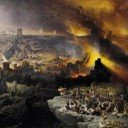As we now begin transition from discussing the context of the passage to beginning a discussion of the actual events described and how to most Biblically interpret those predictions, it is important to take a moment and recognize there are primarily three ways in which a person can interpret this passage, and most other prophetic passages as well. This does not deal with a figurative or literal explanation, but rather when a person believes the events in question took place.
But first let’s quickly review the important subjects recently discussed.
- The discourse follows a series of questions (or one question) from the Disciples regarding the destruction of the Temple
- Jesus had just mentioned that not one stone of the Temple would be upon another
- This was preceded by an indictment against the religious leaders in which he left the Temple desolate
- This included a judgment that all of the blood of all of the saints would be held against “this generation”
- Jesus, in the Olivet Discourse, uses the same generational judgment language
This ultimately leads to when should the reader expect the judgments proclaimed to actually take place. It would seem from the context and the plain language used that those events should have taken place roughly within forty years of the proclamation.
But obviously that assertion is not the case. Many (read: most) Bible Prophecy Experts and most who sit in pews today see these events as being postponed into some future generation, and for the most part, most likely to be fulfilled within our current generation.
But even the futurist has company in not seeing these events as related to first century happening. There are those that see a “dual fulfillment” in which the argument is made that Jesus was describing “both” a first century timing of events and a later, more horrific, end times scenario of events. This camp resides quite often, unfortunately, in the Reformed circle of theology.
Since the majority of the following posts will deal directly with explaining the preterist interpretation and critiquing of the futurist interpretation, I did want to take a moment and deal with what is called “Dual Fulfillment.”
It is often described as a prophet seeing a mountain range from a distance and describing the events he sees as mountain with the mountain range. What the poor prophecy can’t see is just how far apart one mountain may actually be from another mountain. So, from a distance the events may appear to be closely related in their timing, them may actually be separated by great “valleys” of time. There are a few problems with this view as I see it.
- Jesus declares that “ALL these things will take place” within this generation
- Jesus makes no declaration of dual vision
- Jesus actually refers to an Old testament prophecy that was previously fulfilled and warns that something “similar” would take place. Jesus does not state that the previous prophecy represented two separate events but rather that the one that is to come will remind many of the previously fulfilled one.
- Old Testament prophecies may appear to represent a type of dual fulfillment, but they always represent actual events and later events maybe “compared” to those, but do not represent the later events in the actual prophecy
- In addition to number three, when Old Testament prophecies give a time indicator, those events take place within the range of those indicators
- How many fulfillment’s can there be? Has the Olivet Discourse events happened several times in history? Is this how a prophetic utterance from God is to be understood? Do we make it fit our presupposed ideas or do we let the words mean what they say?
Again, the most important part that is so often overlooked by the “Dual Fulfillment” crowd is that Jesus is very clear that the events described would happen within a certain frame.
I understand the difficulty many in Reformed circles have with putting the entire passage into the first generation. There is an assumption that when Jesus refers to a “coming of the Son of Man” that he must be referring to the literal Second Coming. We will discuss in great detail that issue when we reach that portion of the passage, and hopefully with a clearer understanding of the usage of the terms “coming” within the Scriptures, even those in the dual fulfillment camp will see it is completely unnecessary.
So that leaves the present commentator to deal directly with the question; when did these things take place? Can a case be made for a first century fulfillment of these events? That is the direction to which we will now turn.





No comments:
Post a Comment